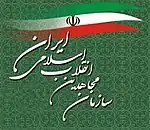Mojahedin of the Islamic Revolution of Iran Organization | |
|---|---|
 | |
| General Secretary | Mohammad Salamati[1] |
| Spokesperson | Mohsen Armin |
| Founded | October 1, 1991[2] |
| Banned | April 2010 |
| Preceded by | Mojahedin of the Islamic Revolution Organization |
| Headquarters | Tehran, Iran |
| Newspaper | Asr-e Maa[1] |
| Ideology | |
| Political position | Left-wing[4] |
| Religion | Islam |
| National affiliation | Council for coordinating the Reforms Front[5] |
| Other affiliation | Coalition of Imam's Line groups (1990s)[6] |
| Website | |
| www | |
Mojahedin of the Islamic Revolution of Iran Organization (MIRO; Persian: سازمان مجاهدین انقلاب اسلامی ایران, romanized: Sāzmān-e Mojāhedin-e Enqelāb-e Eslāmi-e Irān) is a reformist political organization in Iran. It is a small yet influential organization, and participates in political activities similar to a political party. Historian Ervand Abrahamian referred to the group as "a circle of intellectuals and technocrats radical in economic policies but relatively liberal in cultural matters."[7]
Platform
The organization's platform has socialist tendencies.[3] Its charter explicitly states that those who are in politics must be pious and the Guardianship of the Islamic Jurist is the best system of governance during the occultation.[8]
According to Muhammad Sahimi, "One main weakness of the IRMO is perhaps its somewhat rigid ideological thinking. Its members view most issues, even membership in the organization, from an ideological perspective. In the author's opinion, this has hindered its development as a full-fledged political party. Its membership is limited, and they have few offices or organizations in the provinces."[9]
Ban
Following the 2009 election protests, the government suspended the party along with the Islamic Iran Participation Front in April 2010.[10] In November 2011, the interior ministry declared that the party is unable to run for parliament seats in the 2012 elections because its license is revoked.[11]
References
- 1 2 Asayesh, Hossein; Halim, Adlina Ab.; Jawan, Jayum A.; Shojaei, Seyedeh Nosrat (March 2011). "Political Party in Islamic Republic of Iran: A Review". Journal of Politics and Law. Canadian Center of Science and Education. 4 (1): 221–230. doi:10.5539/jpl.v4n1p221. ISSN 1913-9047.
- ↑ "List of Legally Registered Parties in Iran". Khorasan Newspaper. Pars Times. July 30, 2000. p. 4. Retrieved 21 August 2015.
- 1 2 3 Ashraf, Ahmad (April 5, 2012) [December 15, 2007]. "ISLAM IN IRAN xiii. ISLAMIC POLITICAL MOVEMENTS IN 20TH CENTURY IRAN". In Yarshater, Ehsan (ed.). Encyclopædia Iranica. Fasc. 2. Vol. XIV. New York City: Bibliotheca Persica Press. pp. 157–172. Retrieved September 12, 2016.
- ↑ Mohammad Ali Zandi. "Mojahedin of the Islamic Revolution of Iran Organization" (in Persian). Baqir al-Ulum Research Institute. Retrieved 21 August 2015.
- ↑ "Iran groups urge non-violent protests for anniversary". CNN. August 28, 2015. Retrieved March 10, 2015.
- ↑ Bashiriyeh, Hossein (Spring–Summer 2001). "Civil Society and Democratisation during Khatami's First Term". Global Dialogue. Centre for World Dialogue. 3 (2–3): 19–26. ISSN 1986-2601. Archived from the original on 2016-05-07.
- ↑ Abrahamian, Ervand, History of Modern Iran, Columbia University Press, 2008, p.185
- ↑ Gunes Murat Tezcur (2010). Muslim Reformers in Iran and Turkey: The Paradox of Moderation. The University of Texas Press. p. 250. ISBN 978-0-292-72197-5.
- ↑ Muhammad Sahimi (12 May 2009). "The Political Groups". Tehran Bureau. PBS. Retrieved 21 August 2015.
- ↑ Robert F. Worth (19 April 2010), "Iran Mutes A Chorus of Voices for Reform", The New York Times, retrieved 21 June 2017
- ↑ Najah Mohammad Ali (4 November 2011), "Iran bans three reformist parties from participating in upcoming polls", Al Arabiya, retrieved 21 June 2017
External links
- Official Website (Persian)